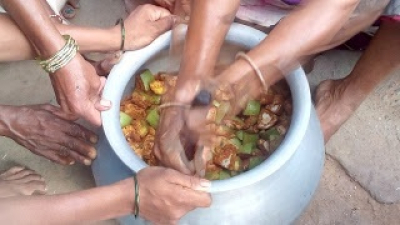Single Women’s Collective Extends Activities in South Odisha, India

Eka Nari Sanghathan (or single women's collective) in Rayagada, South Odisha, India, is continuing to develop initiatives to produce food crops that build social and ecological well-being.
With the support of friends from India and Australia, Eka Nari Sanghathan (ENS) has leased 4 acres of lowland for paddy cultivation and 2 acres of upland for growing the staple food crops of mandiya (finger millets) and biri (black gram).
Co-founder of ENS and CERN member, Bhavya Chitranshi said “The leasing of upland for staple food crops is especially important as this land is generally used for cultivation of cash crops like cotton and eucalyptus.”
“ENS is going against the tide and foregoing cash income so members can cultivate food crops that will directly benefit them and help to repair the uplands.”
“This new initiative extends ENS’s approach of using collective agriculture to reconnect with earth others and revive some of the indigenous practices in agriculture that are slowly getting lost; these practices include multicropping, and use of folk seed varieties and natural fertilizers and pesticides.”
"We are fortunate to have the support of Ashutosh Kumar who has helped steer ENS's approach to collective and ecologically sustainable agriculture."
Other activities undertaken by ENS include preparing mango pickle using mangoes gathered from the forest, with some of the pickle kept for self-consumption and some sold to generate surplus which is collectively appropriated and distributed by ENS members, including to help support older members who are not able to self-sustain.
ENS was formed in 2013 and it brings together women with a range of experiences of singleness whose lives are marked by experiences of pain, violence and otherness (as a result of norms of hetero-patriarchy, primitive accumulation and capitalist development) but whose lives are also shaped by Adivasi (Indigenous) life-worlds based on noncapitalist class processes and the collective enactment of a postcapitalist-feminist future.
ENS hosts friendships and togetherness for women who have been abandoned by their families, who are treated as burdens and liabilities, and who are battered and left alone to survive amidst hetero-patriarchal institutions of marriage and family
By being member-based and member-led, ENS demonstrates how diverse possibilities for survival and care can be developed beyond mainstream programs and interventions.
Co-founder Bhavya Chitranshi was a finalist in 2018 in the Martha Farrell Foundation ‘Most Promising Individual’ award for her work with single Adivasi women across Odisha, including for securing women’s right to a pension from the state government, and establishing food security and a health fund for Adivasi women. She is working on a PhD at Western Sydney University, supervised by Katherine Gibson and Stephen Healy, but during COVID-19 she is living with members of ENS in South Odisha, India.
For more information, contact B.Chitranshi@westernsydney.edu.au
Jenny Cameron
